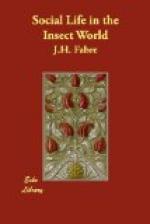The speed of assassination is the more remarkable when we consider the difficulties of attack. The beetle has no endless chain to seize its victim by one leg, hoist it up, and swing it along to the butcher’s knife; it has no sliding plank to hold the victim’s head beneath the pole-axe of the knacker; it has to fall upon its prey, overpower it, and avoid its feet and its mandibles. Moreover, the beetle eats its prey on the spot as it kills. What slaughter there would be if the insect confined itself to killing!
What do we learn from the slaughter-houses of Chicago and the fate of the beetle’s victims? This: That the man of elevated morality is so far a very rare exception. Under the skin of the civilised being there lurks almost always the ancestor, the savage contemporary of the cave-bear. True humanity does not yet exist; it is growing, little by little, created by the ferment of the centuries and the dictates of conscience; but it progresses towards the highest with heartbreaking slowness.
It was only yesterday that slavery finally disappeared: the basis of the ancient social organism; only yesterday was it realised that man, even though black, is really man and deserves to be treated accordingly.
What formerly was woman? She was what she is to-day in the East: a gentle animal without a soul. The question was long discussed by the learned. The great divine of the seventeenth century, Bossuet himself, regarded woman as the diminutive of man. The proof was in the origin of Eve: she was the superfluous bone, the thirteenth rib which Adam possessed in the beginning. It has at last been admitted that woman possesses a soul like our own, but even superior in tenderness and devotion. She has been allowed to educate herself, which she has done at least as zealously as her coadjutor. But the law, that gloomy cavern which is still the lurking-place of so many barbarities, continues to regard her as an incapable and a minor. The law in turn will finally surrender to the truth.
The abolition of slavery and the education of woman: these are two enormous strides upon the path of moral progress. Our descendants will go farther. They will see, with a lucidity capable of piercing every obstacle, that war is the most hopeless of all absurdities. That our conquerors, victors of battles and destroyers of nations, are detestable scourges; that a clasp of the hand is preferable to a rifle-shot; that the happiest people is not that which possesses the largest battalions, but that which labours in peace and produces abundantly; and that the amenities of existence do not necessitate the existence of frontiers, beyond which we meet with all the annoyances of the custom-house, with its officials who search our pockets and rifle our luggage.
Our descendants will see this and many other marvels which to-day are extravagant dreams. To what ideal height will the process of evolution lead mankind? To no very magnificent height, it is to be feared. We are afflicted by an indelible taint, a kind of original sin, if we may call sin a state of things with which our will has nothing to do. We are made after a certain pattern and we can do nothing to change ourselves. We are marked with the mark of the beast, the taint of the belly, the inexhaustible source of bestiality.




